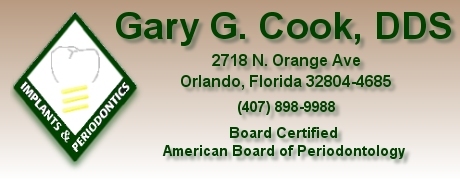


GENERAL SURGICAL PROCEDURESAll surgical procedures that are performed in this office are done using local anesthesia ("Novocain"). The use of this type of anesthetic makes the surgical procedure virtually painless. However, occasionally a patient may be extremely apprehensive about treatment and desire some sedation (anxiolysis). Valium and Triazolam are safe and effective medications used for this purpose. If anxiolysis is chosen, the patient will always be conscious, but may be very sleepy during the procedure because they will be so relaxed. Sometimes the use of Triazolam results in various degrees of amnesia (inability to remember details of events during the surgery on the following day). Also, most patients sleep after they get home for a few hours and wake up feeling quite refreshed. If you have any other questions regarding the use of anxiolysis sedation, please ask Dr. Cook or his knowledgeable staff. PRE-OPERATIVE INSTRUCTIONS1. Do not take aspirin or aspirin containing drugs for 10 days prior to your surgery. These drugs may prolong bleeding during surgery and decrease the ability of the blood to form a clot. Tylenol and ibuprofen (Motrin and Advil) may affect the bleeding time for up to 24 hours after ingestion. It is not required that Plavix be discontinued prior to surgery. Coumadin (Warfarin) and apixaban (Eliquis), on the other hand, must be stopped three days prior to your surgery, in consultation with your physician. 2. Eat a good meal prior to coming for your appointment if no anxiolysis medications have been prescribed. If the anxiolysis protocol is to be used, please follow the directions that will be given to you. 3. Abstain from alcoholic beverages for 24 hours prior to the surgery, since alcohol could cause excessive bleeding during surgery. 4. None of the medications used during the surgical procedure will impair your driving ability unless the anxiolysis protocol with Valium and Triazolam has been prescribed. If Valium and/or Triazolam have been prescribed, you will need to arrange for transportation to and from the office and not drive or operate heavy machinery for 24 hours. POST-OPERATIVE INSTRUCTIONS1. Discomfort and Medications: Periodontal surgery, like other surgical procedures, may be associated with varying degrees of post-operative discomfort. This depends on the procedure involved and individual differences. Assuming you are able to take ibuprofen, we will provide you with a sufficient amount to control your post-operative discomfort. We will give you the first 800 mg dose immediately prior to the surgery along with a nutritional drink (Boost). The second dose of ibuprofen should be taken 6 hours after the first dose, even if you are not experiencing any discomfort. Be sure to have food in your stomach when you take it. After the second dose, if you do not feel a need for pain medication, it is not necessary to take it, unless otherwise directed by Dr. Cook. The vast majority of post-operative patients will do very nicely with two or three doses of ibuprofen. 2. Bleeding: You may notice slight bleeding from the surgical site. This type of minor bleeding the day of the surgery is not unusual and should not be a concern. If at any time you notice any significant bleeding, notify Dr. Cook. 3. Sutures: Sutures (stitches) are placed to hold the gum tissues in the proper position for ideal healing. These sutures will normally be removed approximately one week after the surgery. Try not to disturb the sutures. 4. Dressing: A periodontal dressing is sometimes used to cover the surgical site for approximately one week after surgery. The dressing is placed around your teeth to protect the surgical area and should not be disturbed. If small pieces of dressing become lost and you have no discomfort, there is no cause for concern. If the dressing is causing a concern, please call Dr. Cook. 5. Diet: Do not chew ANY food while your lip is still numb. This will avoid traumatizing your lip. Foods such as yogurt and Smoothies, which do not require any chewing, are fine for the immediate post-operative period. Avoid chewing hard foods in the area of the surgery while the dressing is in place. Drink plenty of fluids. Try to maintain a balanced diet, but with softer foods. 6. Oral Hygiene: Brush and floss the teeth that were not involved in the surgery as usual. The dressing can be brushed gently with the soft brush that we will give you. 7. Physical Activity: Avoid strenuous physical activity the day of the surgery. You can return to your normal routine the following day. 8. Swelling: Some slight swelling of the operated area is not unusual and may begin after the surgery. We will give you an ice pack to minimize swelling. This can be applied intermittently during the first 24 hours. If swelling occurs after the first day, the ice pack can be heated in a microwave oven (following the directions printed on the ice pack) and used as a heat pack to help speed the reduction of the swelling. However, if at any time you have significant swelling or pain, call Dr. Cook. 9. Smoking: Smoking should be avoided during the healing period. Healing results are significantly better in non-smokers. |
Last update: 03/16/2023